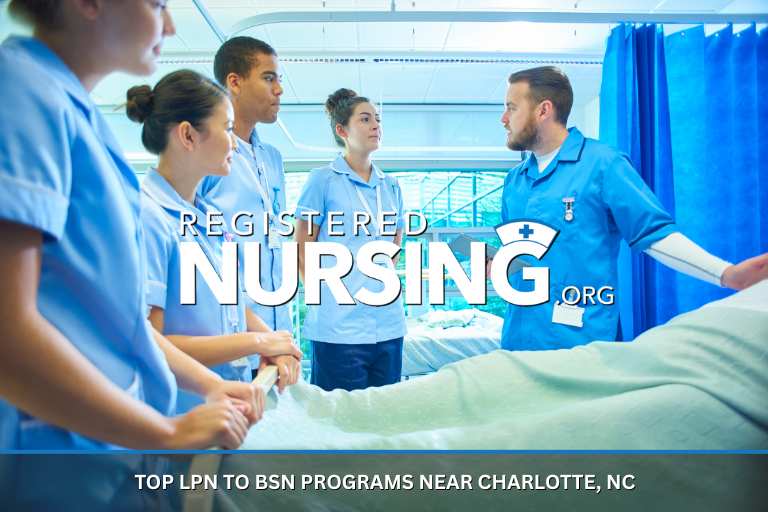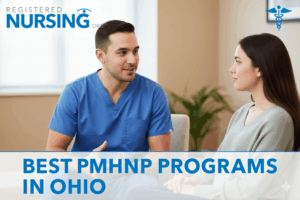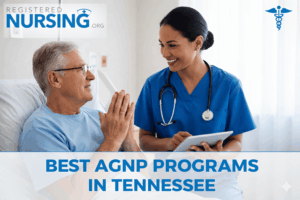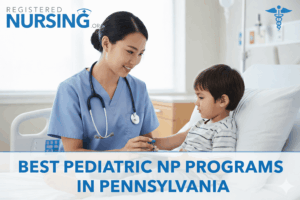Top LPN to BSN Programs Near Charlotte, NC
- 2025 Top LPN to BSN Programs near Charlotte, NC
- What Makes Charlotte a Smart Choice for LPNs
- Inside the Classroom: What LPN to BSN Programs Teach
- Clinical Rotations in the Charlotte Area
- Admissions Overview: Getting Prepared
- Value Beyond the Degree: What a BSN Unlocks
- Financial Planning and Support in North Carolina
- Evaluating Programs: Key Questions to Guide the Decision
- Professional Growth and Salary Potential in Charlotte
- Sources
- Latest Articles & Guides

With North Carolina’s healthcare sector expanding rapidly—and Charlotte positioned as a hub of advanced medical services—Licensed Practical Nurses (LPNs) have more incentive than ever to earn a Bachelor of Science in Nursing (BSN). The U.S. Bureau of Labor Statistics projects an 11% growth in RN demand across the state by 2030. As healthcare systems increasingly seek BSN-prepared nurses, bridge programs offer a smart, efficient way for LPNs to step into more advanced roles.
This guide presents top LPN to BSN program options near Charlotte, NC, while highlighting unique benefits of the region, key admissions insights, financial support strategies, and practical steps to prepare for enrollment and advancement. It also provides a comprehensive look at program structure, course content, and career potential after graduation. Check out other North Carolina nursing programs.
2025 Top LPN to BSN Programs near Charlotte, NC
Queens University of Charlotte
Charlotte, NC - Private 4-year - queens.edu
Bachelor's - LPN to BSN
Campus Based - Visit Website
Queens University of Charlotte's LPN to BSN program offers a transformative educational journey for licensed practical nurses seeking comprehensive professional development. The campus-based curriculum strategically bridges practical nursing expertise with advanced bachelor's-level knowledge, enabling students to expand their clinical capabilities and leadership potential. Emphasizing practical experience and theoretical enrichment, the program prepares nurses for broader healthcare roles with a focus on comprehensive patient care and professional growth. Students benefit from a structured pathway that recognizes their existing nursing foundation while providing advanced educational opportunities for career advancement.
- Campus-based nursing program
- Designed for licensed practical nurses
- Career advancement pathway
- Builds on existing nursing experience
- Bachelor's level nursing education
What Makes Charlotte a Smart Choice for LPNs
Charlotte's healthcare industry is driven by nationally recognized systems such as Atrium Health and Novant Health. These institutions not only provide high volumes of clinical placements but also offer competitive employment packages to BSN-prepared nurses. The city's infrastructure supports continued education with access to both urban and suburban clinical training sites.
In addition to its strong employer base, Charlotte's central location makes it convenient for commuting students from nearby counties. The area's transportation system and suburban affordability enable many to balance school, work, and family responsibilities more effectively than in denser metropolitan centers.
Combined with a lower-than-average cost of living compared to other metro healthcare hubs, Charlotte gives nursing students a cost-effective path to a BSN while offering local advancement opportunities post-graduation. Graduates often remain in the region, contributing to Charlotte's reputation as a leader in clinical education and patient care innovation.
Search other nursing programs in Charlotte.
Inside the Classroom: What LPN to BSN Programs Teach
Academic content in LPN to BSN pathways prepares nurses to deliver evidence-based, patient-centered care. Programs build on foundational LPN knowledge and include upper-division coursework in:
- Community and public health
- Complex adult and geriatric care
- Nursing leadership and healthcare systems
- Nursing research and policy
Curricula also integrate professional development topics such as clinical judgment, legal and ethical responsibilities, and technology in healthcare. This broader scope of education prepares graduates to work in more autonomous and specialized roles than those available to LPNs.
Sample Curriculum Components
| Course Title | Description |
| Advanced Health Assessment | Techniques for thorough physical evaluations |
| Pathophysiology | Mechanisms of disease processes |
| Nursing Ethics & Law | Legal and ethical decision-making in practice |
| Evidence-Based Practice | Integration of clinical research into patient care |
| Community Health Nursing | Population-focused care strategies |
Clinical Rotations in the Charlotte Area
Charlotte-based programs often partner with regional hospitals, clinics, and long-term care facilities to offer clinical practicum experiences. These placements give students access to high-acuity environments and interprofessional collaboration, preparing them for diverse RN roles.
Clinical rotations typically occur across multiple healthcare settings, including emergency departments, pediatric units, rehabilitation centers, and home health agencies. Exposure to different environments ensures that students build versatility and confidence in their clinical skills.
Local facilities like Levine Children's Hospital and Carolinas Medical Center regularly host nursing students and may serve as future employers post-licensure. Some programs also offer simulation lab training to supplement real-world experience, helping students build muscle memory for critical procedures in a controlled setting.
Admissions Overview: Getting Prepared
Planning ahead is essential for a successful transition from LPN to BSN. Most programs in the region have rolling admissions or multiple start dates per year, allowing for flexible enrollment. However, because space is limited, early application is strongly recommended.
Standard Requirements Include:
- Current LPN license (unencumbered)
- Completion of prerequisites (anatomy, microbiology, English composition)
- GPA minimum, usually 2.5 or higher
- TEAS or HESI test scores
- Resume or personal essay
- Background check and immunization records
Some institutions may request letters of recommendation from nursing supervisors or faculty. Many programs also conduct interviews or require proof of recent clinical practice.
Applicants are encouraged to request transcripts early, as processing can delay acceptance into competitive cohorts. Academic advisors are typically available to assist with prerequisite planning and credit evaluations.
Value Beyond the Degree: What a BSN Unlocks
In addition to qualifying graduates for the NCLEX-RN exam, BSN programs cultivate critical thinking, leadership readiness, and population health awareness. Employers increasingly prefer BSN graduates for roles that involve complex clinical judgment or team coordination.
BSN-prepared nurses are more likely to pursue specialty certifications, such as Certified Emergency Nurse (CEN) or Certified Pediatric Nurse (CPN). These credentials not only enhance job prospects but also improve patient safety and care outcomes.
According to the American Association of Colleges of Nursing (AACN), BSN-prepared nurses demonstrate improved patient outcomes, including lower mortality rates and reduced medication errors. A BSN also serves as a stepping stone toward graduate education, including nurse practitioner, clinical nurse specialist, and nurse educator programs.
Financial Planning and Support in North Carolina
Earning a BSN is a long-term investment, but state and local resources can help mitigate costs. In Charlotte and throughout North Carolina, multiple aid options are available. Many employers also offer tuition reimbursement or sign-on bonuses for BSN-educated nurses.
Scholarships may be awarded based on merit, financial need, or commitment to serving underrepresented communities. Nontraditional students—such as adult learners and first-generation college students—may qualify for additional funding opportunities.
Notable Aid Programs
| Program Name | Details |
| Forgivable Education Loans for Service (FELS) | Offers funding to students who work in NC post-grad |
| Employer Tuition Assistance (Atrium, Novant) | Tuition reimbursement for current employees |
| Community College Transfer Grants | Support for students transferring from ADN pathways |
| FAFSA & State Grants | Federal and NC-specific nursing grants |
| Nurse Corps Scholarship Program | National funding in exchange for service commitments |
Students should also consider part-time enrollment to maintain income while completing coursework. Loan repayment plans and income-driven repayment options can provide relief after graduation.
Evaluating Programs: Key Questions to Guide the Decision
Making the leap from LPN to BSN involves more than choosing the closest school. To find the best fit, ask the following:
- Is the program accredited by ACEN or CCNE?
- Does it offer evening or hybrid formats for working students?
- What are the most recent NCLEX-RN pass rates?
- Are clinicals offered locally in Charlotte?
- What job placement support is available?
- Are alumni employed at regional hospitals or continuing into graduate study?
Answers to these questions provide clarity on a program's flexibility, quality, and student outcomes. Reviewing graduation and employment rates can also help identify programs with a strong track record of student success.
Professional Growth and Salary Potential in Charlotte
Graduates entering the RN workforce in Charlotte can expect strong compensation and long-term career mobility. According to the U.S. Bureau of Labor Statistics, the average annual wage for RNs in the area is approximately $78,000.
BSN-prepared professionals often advance into positions such as:
- Charge nurse or nurse manager
- Public health or community outreach nurse
- Case management or utilization review
- Graduate school candidates for APRN, NP, or DNP roles
- Infection preventionist or nurse quality specialist
In addition to clinical roles, BSN graduates may pursue careers in health informatics, policy development, or clinical education. The city's healthcare expansion, coupled with its role as a healthcare innovation center in the Southeast, makes Charlotte an excellent launchpad for advanced nursing careers.
Sources
- U.S. Bureau of Labor Statistics – Registered Nurses
- North Carolina Board of Nursing
- American Association of Colleges of Nursing (AACN)
- FAFSA – Federal Student Aid
- North Carolina Community Colleges Transfer Info
- Atrium Health
- Novant Health
Latest Articles & Guides
One of the keys to success as a registered nurse is embracing lifelong learning. Our articles and guides address hot topics and current events in nursing, from education to career mobility and beyond. No matter where you are on your nursing journey, there’s an article to help you build your knowledge base.
Browse our latest articles, curated specifically for modern nurses.



